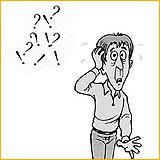| Mental Health Tips | |
| Common Mental Problems | |
| Substance Misuse | |
| Treatment of Mental Disorders | |
| Mental Health Education Pamphlets | |
 Obsessive Compulsive Disorder (OCD)
Obsessive Compulsive Disorder (OCD)
(Special thanks to Dr. Venus Tam of Institute of Mental Health, Castle Peak Hospital, for authoring this article)
Obsessive-compulsive disorder (OCD) is broadly classified as one of anxiety disorders, characterised by intrusive thoughts that produce uneasiness or apprehension (obsessions) and/or repetitive behaviours aimed at reducing the associated anxiety (compulsions). Symptoms of the disorder are diverse, including excessive washing or cleaning, checking, hoarding; preoccupation with sexual, violent or religious thoughts and so on. Although the sufferers know that these thoughts and behaviours are excessive and irrational, they cannot control their impulses and spend increasing amount of time on these repetitive thoughts and behaviours. It causes distress to themselves and their family members, and even financial problems.
1. What is Obsessive-compulsive Disorder (OCD)?
2. What are the symptoms of OCD?
3. Are all repetitive behaviours compulsions? Do all people with obsessions or compulsions suffer from OCD?
4. What causes OCD?
5. How to diagnose OCD?
6. How to treat OCD?
7. How to treat OCD in children or adolescents?
1. What is Obsessive-compulsive Disorder (OCD)?
Obsessive-compulsive Disorder (OCD) is one of the anxiety disorders. One in fifty people would have the chance of suffering from OCD in their lifetime and the ratio of male to female patients is equal. Many children have mild ‘obsessive’ behaviours such as tidying up their toys very carefully or avoid stepping on the gaps on the streets, but usually these behaviours would disappear when they grow up. OCD in adulthood usually has onset in adolescence or early twenties, and usually male patients have earlier onset compared to female ones. The severity of symptoms may vary with time, but many patients only seek help after years of onset of symptoms.
2. What are the symptoms of OCD?
OCD consists of three major symptoms: obsessions, compulsions and associated anxiety.
Obsessions are those repetitive, excessive and irrational thoughts that the sufferers find distressing but unable to resist. The common obsessions include obsessional ruminations, doubts and rituals. Obsessional ruminations are internal debates in which arguments for and against even the simplest everyday actions are reviewed endlessly. Some obsessional doubts concern actions that may not have been completed adequately, such as securing a door; or concern actions that might have harmed other people, such as driving a car past a cyclist. Obsessional rituals include both mental activities, such as counting repeatedly in a special way or repeating certain form of words or behaviours, such as concern about symmetry and steps. Some OCD sufferers may have obsessional thoughts in the form of single words, phrases, or rhymes, which are usually unpleasant or shocking to the person, and may be obscene or blasphemous. Some may have obsessional impulses to perform violent or sexual acts which are out of their usual characters. Although the sufferers know their thoughts are irrational, they feel they cannot get rid of these thoughts. As the severity of obsessions may increase with time, the sufferers may become more distressed and have difficulty to cope with everyday life, or even cause misunderstandings of other people.
Some OCD sufferers may also have compulsions. Sometimes it may be just the pure repetitive impulses to perform a particular ‘ritual’, sometimes it may be a way to lessen anxiety followed by obsessions. The common compulsions include avoidance, checking, hoarding, stereotypic rituals (e.g. washing the hands 20 or more times a day), extreme slowness, repeated reassurance (i.e. requiring other people to reassure you that everything is done perfectly) or rituals to ‘undo’ obsessions, such as counting, repeating a particular phrase or touching things for a particular number of times before leaving rooms. These compulsions are time-consuming and cause the OCD sufferers spend long time before they can go out or do other productive activities. They may also cause some other physical problems such as dermatitis related to frequent hand-washing.
Associated with obsessions and compulsions, the OCD sufferers usually feel anxious, guilty, disgusting or depressed.
3. Are all repetitive behaviours compulsions? Do all people with obsessions or compulsions suffer from OCD?
Although some people like to do the same things repeatedly, it does not mean that all repetitive behaviours are compulsions. For instance, if you have repeated practices when you learn a new skill, or perform some religious rituals, these repetitive behaviours are not counted as compulsions. Therefore, to judge if a behaviour is compulsion, we need to consider the form and the rationality in the context. Sometimes, we use ‘obsessional’ to describe people with habits of gambling, drinking, substance abuse or excessive exercise. However, these behaviours are usually pleasant, whereas the OCD sufferers always find their compulsions unpleasant and distressing.
The ordinary people sometimes also have repetitive thoughts or behaviours, for example, they believe some particular numbers are ‘magic number’ and need to perform some rituals before some important events. However, these thoughts or behaviours usually do not affect their daily life seriously. Some other mental problems, such as Body Dysmorphic Disorder, Hypochondriasis, Trichotillomania or Tourette Syndrome, their sufferers also have repetitive worries or behaviours, but the underlying cause is different from that of OCD. People with Obsessive-compulsive personality disorder also have obsessions and compulsions, but they do not feel that they are irrational, or even enjoy these activities. Besides, some autistic children may be very stubborn and prefer things kept unchanged. They like to do some particular behaviours to lessen their anxieties related to changes. And some people with depression or other anxiety disorders may also have obsessions and compulsions, but these are usually not their major symptoms.
4. What causes OCD?
The causes of OCD include psychological, biological and environmental factors.
Psychologically, some people are particularly perfectionistic, have exceptionally high moral standard or have particular concern about details. These characteristics are useful in general but would precipitate the onset of OCD if they become extreme.
Biologically, OCD may be caused by genetic mutation. Those with family history of OCD may have higher chance to suffer from OCD, particularly those have onset at childhood or adolescence. Research also showed that imbalance of serotonin in the brain, developmental delay and Streptococcal A infection may cause symptoms of OCD.
And about one-third of OCD cases are precipitated by stressful events.
5. How to diagnose OCD?
According to ‘The Diagnostic and Statistical Manual of Mental Disorders, 4th Edition’ (DSM-IV) or ‘the International Statistical Classification of Diseases and Related Health Problems 10th Revision, Chapter V: Mental and Behavioural Disorders’ (ICD-10), psychiatrists or clinical psychologists can diagnose a person suffering from OCD based on the above mentioned obsessions and compulsions. The obsessions are repetitive, intrusive and cause significant anxiety or distress. The sufferers need to perform compulsions to lessen the associated anxiety, but find these obsessions and compulsions irrational, excessive and time-consuming, causing impairments in social, occupation, academic, family or other aspects.
6. How to treat OCD?
Every OCD sufferers may have different treatment plan according to the different individual needs and symptoms, and you can discuss the treatment plan with your therapists, your friends and family members. Many OCD sufferers with mild severity may have improvement of symptoms without intensive treatment, but it usually does not occur in those with moderate to severe OCD.
The most commonly used treatment nowadays is psychological treatment and medication.
The major psychological treatment is Cognitive Behavioural Therapy (CBT), including Exposure and Response Prevention (ERP) and Cognitive Therapy (CT). In CBT, OCD sufferers attempt to face the fearful situations gradually and prevent themselves from performing the usual compulsions at the same time, to wait the anxiety waning off and prevent further strengthening of vicious cycle between compulsions and anxiety. And via Cognitive Therapy, therapists assist the OCD sufferers to change the reaction to those obsessional thoughts and target on their self-criticism, helping them to look at things in different perspectives.
For medication, Selective Serotonin Reuptake Inhibitor (SSRI) can correct the imbalance of serotonin level inside the brain and decrease the frequency and severity of obsessions and compulsions. The dosage used in OCD is usually higher than that in treatment of depression. If the sufferers do not have significant improvement with SSRI, there are still some other choices of medication. For those OCD sufferers with moderate to severe severity, medication can be used solely or combined with CBT. About six in ten people show improvement in symptoms after start of medication, with average reduction of half of the symptoms. Medication can help to prevent relapse and is necessary to keep medication for at least one year. Those pregnant or breast-feeding ladies need to discuss with the therapists to check if they are appropriate to continue medication. However, the recurrence rate is high after medication is stopped, i.e. about half of them may have recurrence of symptoms few months after termination of medication. The recurrence rate may be smaller if medication is combined with the use of CBT.
OCD is usually treated in out-patient setting. However, if the symptoms are very severe and impairing to self-care, or the sufferers have suicidal idea or other severe mental problems such as eating disorder or severe depression, in-patient treatment may be necessary.
7. How to treat OCD in children or adolescents?
OCD in childhood or adolescence is usually precipitated by stressors such as bullying or change of family dynamics such as parental divorce or domestic violence. Therefore, in treatment of OCD in children or adolescents, we need to target at these environmental factors. As in the adult OCD, cognitive behaviour treatment can help to control the symptoms with the help and encouragement of parents and other family members. The treatment required may be as short as few sessions or up to one to two years. Medication use may be also necessary if the symptoms are severe.
Websites with relevant information / Reference
|
================================================================================ Thank you for browsing the mental health tips on the IMH internet. We would like to hear feedback from you through the questionnaire below. Your comments are most welcome for our continuous improvement. |
No. of visitors of this page: 5181


